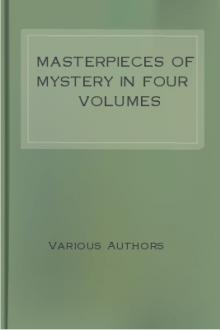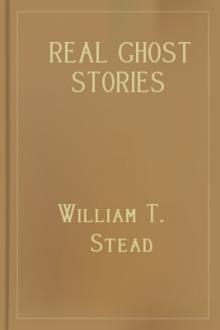Varney the Vampire; Or, the Feast of Blood by Prest and Rymer (ereader iphone .txt) 📗

- Author: Prest and Rymer
Book online «Varney the Vampire; Or, the Feast of Blood by Prest and Rymer (ereader iphone .txt) 📗». Author Prest and Rymer
They now neared the grave, the clergyman officiating as usual on such occasions. There was a large mob of persons on all sides, with serious faces, watching the progress of the ceremony, and who listened in quietness.
There was no sign of any disturbance amongst the people, and the authorities were well pleased; they congratulated themselves upon the quietness and orderliness of the assemblage.
The service was ended and the coffin lowered, and the earth was thrown on the coffin-lid with a hollow sound. Nobody could hear that sound unmoved. But in a short while the sound ceased as the grave became filled; it was then trodden carefully down.
There were no relatives there to feel affected at the last scene of all. They were far away, and, according to popular belief upon the subject, they must have been dead some ages.
The mob watched the last shovel-full of earth thrown upon the coffin, and witnessed the ramming down of the soil, and the heaping of it over at top to make the usual monument; for all this was done speedily and carefully, lest there should be any tendency to exhume the body of the deceased.
The people were now somewhat relieved, as to their state of solemnity and silence. They would all of them converse freely on the matter that had so long occupied their thoughts.
They seemed now let loose, and everybody found himself at liberty to say or do something, no matter if it were not very reasonable; that is not always required of human beings who have souls, or, at least it is unexpected; and were it expected, the expectation would never be realized.
The day was likely to wear away without a riot, nay, even without a fight; a most extraordinary occurrence for such a place under the existing circumstances; for of late the populace, or, perhaps, the townspeople, were extremely pugnacious, and many were the disputes that were settled by the very satisfactory application of the knuckles to the head of the party holding a contrary opinion.
Thus it was they were ready to take fire, and a hubbub would be the result of the slightest provocation. But, on the present occasion, there was a remarkable dearth of, all subjects of the nature described.
Who was to lead Israel out to battle? Alas! no one on the present occasion.
Such a one, however, appeared, at least, one who furnished a ready excuse for a disturbance.
Suddenly, Mrs Chillingworth appeared in the midst of a large concourse of people. She had just left her house, which was close at hand, her eyes red with weeping, and her children around her on this occasion.
The crowd made way for her, and gathered round her to see what was going to happen.
"Friends and neighbours," she said "can any of you relieve the tears of a distressed wife and mother, have any of you seen anything of my husband, Mr. Chillingworth?"
"What the doctor?" exclaimed one.—"Yes; Mr. Chillingworth, the surgeon. He has not been home two days and a night. I'm distracted!—what can have become of him I don't know, unless—"
Here Mrs Chillingworth paused, and some person said,—
"Unless what, Mrs Chillingworth? there are none but friends here, who wish the doctor well, and would do anything to serve him—unless what? speak out."
"Unless he's been destroyed by the vampyre. Heaven knows what we may all come to! Here am I and my children deprived of our protector by some means which we cannot imagine. He never, in all his life, did the same before."
"He must have been spirited away by some of the vampyres. I'll tell you what, friend," said one to another, "that something must be done; nobody's safe in their bed."
"No; they are not, indeed. I think that all vampyres ought to be burned and a stake run through them, and then we should be safe."
"Ay; but you must destroy all those who are even suspected of being vampyres, or else one may do all the mischief."—"So he might."
"Hurrah!" shouted the mob. "Chillingworth for ever! We'll find the doctor somewhere, if we pull down the whole town."
There was an immense commotion among the populace, who began to start throwing stones, and do all sorts of things without any particular object, and some, as they said, to find the doctor, or to show how willing they were to do so if they knew how.
Mrs. Chillingworth, however, kept on talking to the mob, who continued shouting; and the authorities anticipated an immediate outbreak of popular opinion, which is generally accompanied by some forcible demonstration, and on this occasion some one suggested the propriety of burning down Bannerworth Hall; because they had burned down the vampyre's home, and they might as well burn down that of the injured party, which was carried by acclamation; and with loud shouts they started on their errand.
This was a mob's proceeding all over, and we regret very much to say, that it is very much the characteristic of English mobs. What an uncommonly strange thing it is that people in multitudes seem completely to get rid of all reason—all honour—all common ordinary honesty; while, if you were to take the same people singly, you would find that they were reasonable enough, and would shrink with a feeling quite approaching to horror from anything in the shape of very flagrant injustice.
This can only be accounted for by a piece of cowardice in the human race, which induces them when alone, and acting with the full responsibility of their actions, to shrink from what it is quite evident they have a full inclination to do, and will do when, having partially lost their individuality in a crowd, they fancy, that to a certain extent they can do so with impunity.
The burning of Sir Francis Varney's house, although it was one of those proceedings which would not bear the test of patient examination, was yet, when we take all the circumstances into consideration, an act really justifiable and natural in comparison with the one which was now meditated.
Bannerworth Hall had never been the residence even of anyone who had done the people any injury or given them any offence, so that to let it become a prey to the flames was but a gratuitous act of mischief.
It was, however, or seemed to be, doomed, for all who have had any experience in mobs, must know how extremely difficult it is to withdraw them from any impulse once given, especially when that impulse, as in the present instance, is of a violent character.
"Down with Bannerworth Hall!" was the cry. "Burn it—burn it," and augmented by fresh numbers each minute, the ignorant, and, in many respects, ruffianly assemblage, soon arrived within sight of what had been for so many years the bane of the Bannerworths, and whatever may have been the fault of some of that race, those faults had been of a domestic character, and not at all such as would interfere with the public weal.
The astonished, and almost worn-out authorities, hastily, now, after having disposed of their prisoners, collected together what troops they could, and by the time the misguided, or rather the not guided at all populace, had got halfway to Bannerworth Hall, they were being outflanked by some of the dragoons, who, by taking a more direct route, hoped to reach Bannerworth Hall first, and so perhaps, by letting the mob see that it was defended, induce them to give up the idea of its destruction on account of the danger attendant upon the proceeding by far exceeding any of the anticipated delight of the disturbance.
When we praise our friend Mr. Chillingworth for not telling his wife where he was going, in pursuance of a caution and a discrimination so highly creditable to him, we are quite certain that he has no such excuse as regards the reader. Therefore we say at once that he had his own reasons now for taking up his abode at Bannerworth Hall for a time. These reasons seemed to be all dependant upon the fact of having met the mysterious man at Sir Francis Varney's; and although we perhaps would have hoped that the doctor might have communicated to Henry Bannerworth all that he knew and all that he surmised, yet have we no doubt that what he keeps to himself he has good reasons for so keeping, and that his actions as regards it are founded upon some very just conclusions.
He has then made





Comments (0)